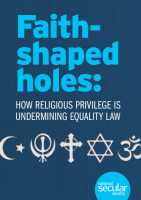Bigotry based on the idea of 'caste' has no place in modern Britain.
We want to see those at risk of caste discrimination protected by UK law.
'Caste' systems are rooted in ancient religious and cultural beliefs. They are imbued with inequality and discrimination, and are wholly incompatible with human rights.
There are an estimated 50,000 – 200,000 people in the UK who are regarded by some as 'low caste' (sometimes known as 'dalits') and at risk of caste discrimination. There is evidence of caste-based discrimination and harassment present in employment, education and in the provision of services.
Caste-based prejudice and discrimination is a gross violation of human rights and must not be tolerated. All individuals have the right to protection against discrimination on the basis of their caste or perceived caste, in the same way that they do on the basis of race or gender
Our equality laws do not explicitly deal with the issue of caste, meaning victims of caste discrimination have to use unclear and precarious case law to secure justice. Both parliament and the United Nation Human Rights Council have called on the government to explicitly outlaw caste-based discrimination, but it has delayed doing so for years.
It's time to outlaw caste discrimination.
Take action!
1. Have you experienced caste discrimination? Report it!
The Dalit Solidarity Network's "everyday casteism" campaign is cataloguing instances of casteist behaviour, including incidents of discriminatory or caste hate speech behaviour, experienced on a day to day basis by people perceived to be 'lower' caste in the UK.
If you have been affected by caste discrimination, please consider reporting it to them.
You can also report caste discrimination to the Anti Caste Discrimination Alliance here.
2. Write to your MP
Tell your MP that it's time to outlaw caste discrimination.
3. Join the National Secular Society
Become a member of the National Secular Society today! Together, we can separate religion and state for greater freedom and fairness.
Latest updates
NSS welcomes vote to outlaw caste discrimination
Posted: Tue, 5 Mar 2013 06:51
The National Secular Society has welcomed a vote by Peers in the House of Lords in favour of an amendment to bring caste discrimination within the scope of equality legislation. The vote was a heavy defeat for the Government, losing by 103 votes, with 256 peers supporting the amendment and 153 voting against.
The amendment to the Enterprise and Regulatory Reform (ERR) Bill was moved by members of the All Party Parliamentary Group for Dalits – the Lib Dem Peer and NSS honorary Associate Lord Avebury (pictured right), the Conservative Lord Deben, Crossbench Peer Lord Harries and Labour's Lady Thornton – and received crossbench support.
Prior to the vote the National Secular Society briefed Peers and Ministers with a legal opinion obtained by the NSS, which concluded that the UK is obliged in international human rights law to legislate for caste discrimination and further obliged to provide victims of such discrimination with an effective remedy.
The opinion stated that the Government's failure to do so is a violation of Article 2 (1) and 6 of the International Convention on the Elimination of All Forms of Racial Discrimination.
Last year the UN Human Rights Council also called on the UK Government to "develop a national strategy to eliminate caste discrimination, including the immediate adoption of the clause in the Equality Act … in accordance with its international human rights obligations".
Secular and anti-discrimination campaigners persuaded the previous Labour Government to amend the Equality Bill, to include an enabling power to make caste a protected characteristic as a result of which discrimination and harassment on the grounds of caste would be outlawed.
The current Government has however resisted triggering the power despite a report into the prevalence of caste prejudice and discrimination in the UK, undertaken by the National Institute for Economic and Social Research (NIESR), which found significant evidence of caste discrimination, harassment and bullying in employment, education and the provision of services, including care.
Defending the Government's position during Monday's debate, Baroness Stowell of Beeston described new legislation as "a big step" and said the Government was taking clear action to tackle caste prejudice and discrimination through a programme of education. She explained that the education initiative – a joint initiative between the Department for Communities and Local Government and the Government Equalities Office – had already appointed a body called 'Talk for a Change' to take the work forward.
Keith Porteous Wood, Executive Director of the National Secular Society, said: "The Government set a poor example by refusing to follow the UN's recommendation last year to the UK to make caste discrimination unlawful – as it was obliged to do so by its international obligations. Instead, all the Government offered those suffering from caste discrimination was conciliation where there is conflict. The peers, however, were determined to aid the vulnerable more effectively by providing legal protection on caste. Their view prevailed, leaving the Government embarrassed."
The amendment will now need the support of a majority of MPs in the House of Commons before it can become law.
Read Monday's debate in full at Hansard
Read the International Humanist and Ethical Union (IHEU) Conway Hall Declaration on Untouchability (signed in 2009)



